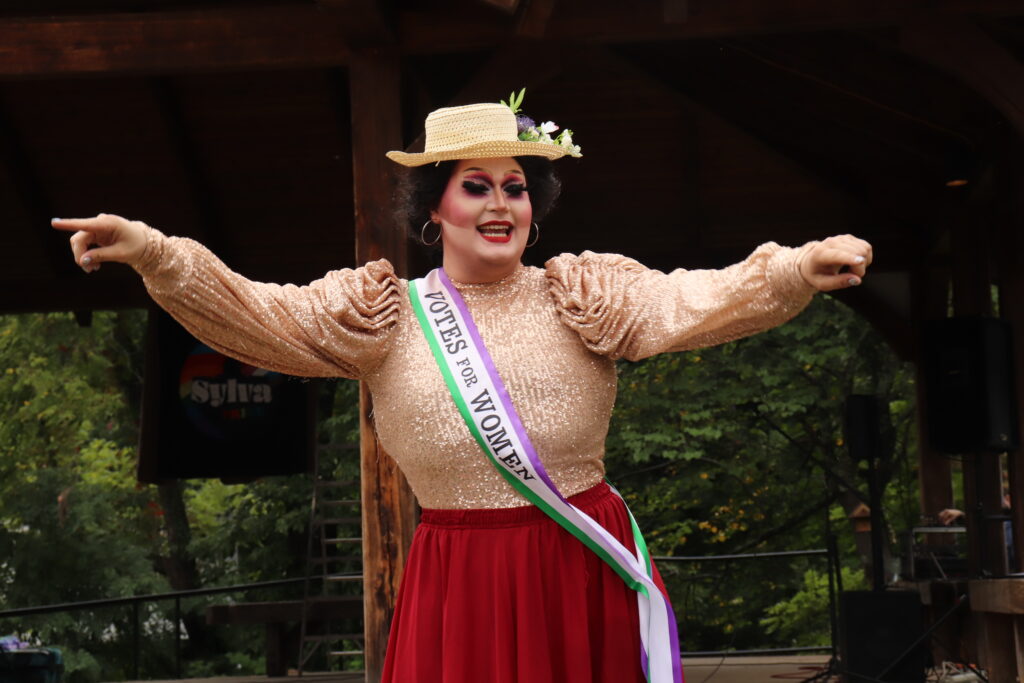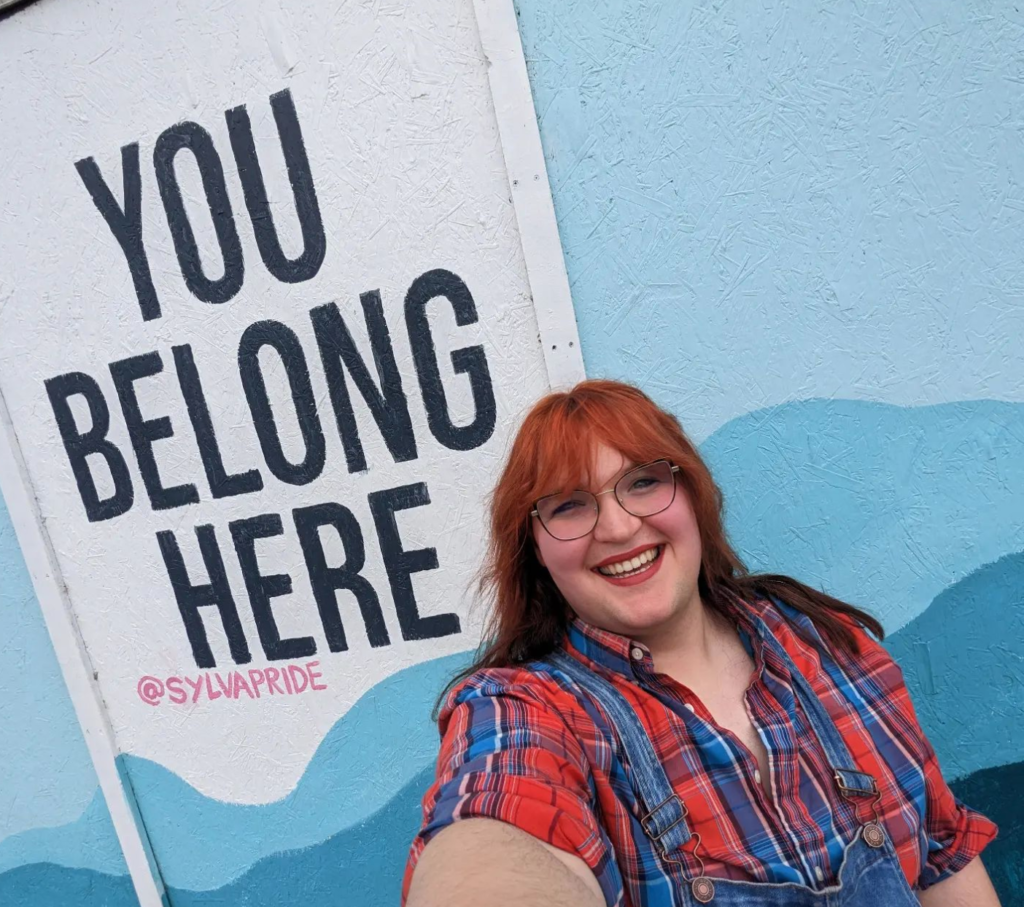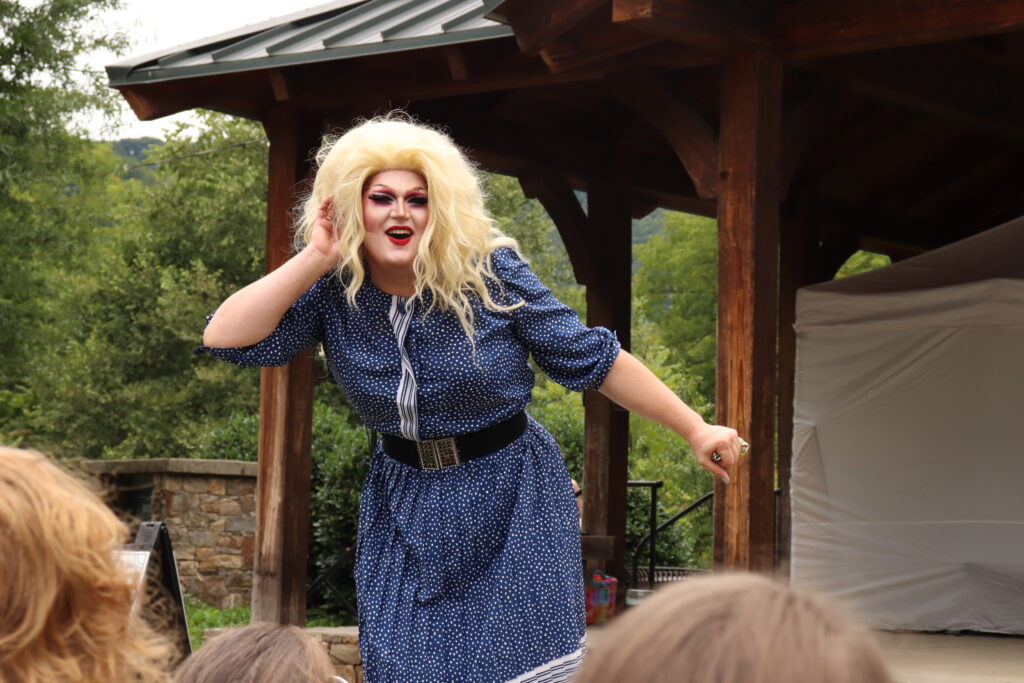Beulah Land, a local drag queen, artist and advocate for social change talks about what it’s like being a drag queen. She begins her day as any of us. Her daily job is working as a barista in downtown Sylva. But when the day draws to a close, Land gets to a different type of werk.

She begins our interview by explaining the importance of her drag name.
“My drag name is Beulah Land, and as an environmental health science student, I really want to drum home the importance of taking care of the environment.”
She goes on to say that taking care of the environment involves much more than picking up litter. It involves caring for the planet but also the people around us in our community.
“It involves picking up your trash from the side of the road. You may not think of that as the environment but that is in your immediate vicinity and litter and climate change and vaping and access to healthcare resources, all of this is taken care of your environment and that’s going to take care of you,” said Land.

She got her start in October 2017 when Land performed at the drag show held on WCU’s campus. From there, they started performing in Asheville before attempting to create a sustainable drag scene in Sylva and Cullowhee. The shows created from this effort include shows like Mad for Drag, What the Cat Dragged In, and the Sylva Belles which have been running for over 3 years.
Being born and raised in Western North Carolina has shaped Land greatly and set the values that she follows in life as well as a performer.
“My family has lived in Western North Carolina for about 300 years. I grew up 20 minutes north of Asheville just shy of the Tennessee border on a 50-acre farm. My mom is a high school teacher. My dad was a farmer, a caterer, a grant worker, an advocate, a community member; like my family did it all,” said Land.
From their humble origins, they grew a love for community service. “Some of my fondest memories include food service and catering meals and bringing people together… really making that community and that’s really what I’ve been trying to do with Sylva Belles drag, Mad for Drag and all of our activities here from a queer perspective.”
Land reminisces of their early years dedicated to doing good in the community. “Growing up in a southern Missionary Baptist household, we took service work really seriously. On Christmas Day, we would open our presents the night before Christmas Eve but then we would spend all morning Christmas day delivering food to disadvantaged individuals and families that didn’t have a warm meal,” said Land.
In high school, Land faced some struggles and due to that was no longer welcomed in the church they grew up in. They came to WCU in 2017 and found the love and support that had been missing at church and within their community.
Their service work in the Sylva and Cullowhee communities is on uniting people and bringing a better world. Land is a community health leader with the Appalachian Access Project. They promote health resources for queer individuals, with a specific interest toward access to gender affirming care for trans individuals, STI prevention and screening services.

Land is also involved with the Jackson County Food Council.
“Food has been a central tenant in my upbringing and so it only makes sense. I’m an environmental health student here at Western and so a part of my job could be one day being the health inspector at restaurants and stuff like that. So I’m working on the Jackson County food council as sort of like a coordinator so putting together meetings [and] managing the social media.” Land also works with Cornbread And Roses and is trying to create some real change in the community by promoting a safe space for all people regardless of how they identify.

Outside of her draw to service work and creating a community, Land also pulls inspiration from the song Crowded Table by The Highwomen.
“[It] very much sums up my sort of attitude. So the lyrics go: ‘I want a house with a crowded table in a place by the fire for everyone.’ A lot of times as queer people we often feel like we’re not invited, like we don’t have a place, like we’re on our own. By embracing everyone and learning from everyone, by extending an olive branch and by listening that’s where I really want our drag scene to move forward,” Land said. “I would really like to work on promoting diversity equity and inclusion in all of my work. I really do firmly believe that there is a place at the table for everyone and everyone’s welcome. I’m trying to work on making everyone feel welcomed and controlling my environment so that everyone feels welcome.”
In light of recent legislation, gender affirming care for trans individuals is now illegal in the following states: Arkansas, Florida, Georgia, Idaho, Indiana, Iowa, Kentucky, Mississippi, Missouri, Montana, North Dakota, Oklahoma, South Dakota, Tennessee, Utah, West Virginia. Though no bans have been passed yet in North Carolina, the Senate Bill 560 and Senate Bill 639, titled the “Medical Treatment for Minor’s Act” limits access to gender-affirming care to minors. Neither bill mentions gender treatment for children born intersex, which is still allowed.
Land reflects on this and admits she may get a bit emotional when talking on this topic.
“I’m a trans women,” says Land. “I’ve been medically transitioning for a year and a few months. I grew up 6 minutes across the border from Tennessee, my family has all moved to Tennessee and my concern is, am I going to get charged with a felony when I go visit family?”
They explained that in their opinion, this legislations is not about protecting children but a way to “blame a minority of people that act in a way that’s just different.”
“Real victims of this legislation are not really drag queens because most drag queens don’t want to have anything to do with children. I love doing Drag Queen Story Hour but I’m more the exception than the rule. This is attacking trans and non-binary people and that’s who’s really going to see a lot of the violence and a lot of the discrimination out of this legislation.” She admits that times like this make her extremely nervous for the future.
With so much of her life dedicated to service work revolving around access to health care, they are particularly concerned for the trans youth. “Hormone replacement therapy saved my life, that’s what I always say. I feel much more in tune with my body because I listened to a doctor, and they got me the medication that I needed to stay alive and to live a happier healthier life. I can’t imagine going through this journey as a teen then being told that I no longer have access to that and having to go off of my medications and then my body engaging in ways that trigger my dysphoria all over again,” said Land.
Children in Tennessee, Kentucky, Arkansas, Mississippi and many more are now having to figure out where they are going to get medication from and where they can access healthcare.
“For a party to be so adamant about freedom of speech, about ‘oh we’re freedom we want to make our own decisions,’ well you’re certainly not letting an entire group of people make their own decisions. Especially decisions that do not concern you,” said Land.
They wonder what is even being protected with these bans. “I think that’s what we really need to be asking ourselves. Who are we really protecting? Are we protecting children from seeing a big scary drag queen, are we protecting the sensibilities of an upper-class white cisgender heterosexual person? The legislation is a slap in the face. But this is not the first time that drag has been illegal.”
Land stays hopeful in knowing that drag as we know it has been around since about the 1890s and even then, it was heavily legislated against. “It’s not going to stop drag queens or trans people, but it will hurt and it’s going to be another set of challenges that we must overcome as a community.”


